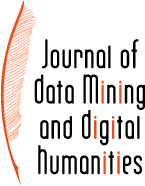 |
Andrea Bertino ; Luca Foppiano ; Laurent Romary ; Pierre Mounier - Leveraging Concepts in Open Access Publications
jdmdh:5081 - Journal of Data Mining & Digital Humanities, 15 juin 2020, 2019 - https://doi.org/10.46298/jdmdh.5081- 1 Göttingen State and University Library
- 2 Automatic Language Modelling and ANAlysis & Computational Humanities [ALMAnaCH]
- 3 Centre pour l'édition électronique ouverte [EHESS]
- 4 École des hautes études en sciences sociales
This paper addresses the integration of a Named Entity Recognition and Disambiguation (NERD) service within a group of open access (OA) publishing digital platforms and considers its potential impact on both research and scholarly publishing. The software powering this service, called entity-fishing, was initially developed by Inria in the context of the EU FP7 project CENDARI and provides automatic entity recognition and disambiguation using the Wikipedia and Wikidata data sets. The application is distributed with an open-source licence, and it has been deployed as a web service in DARIAH's infrastructure hosted by the French HumaNum. In the paper, we focus on the specific issues related to its integration on five OA platforms specialized in the publication of scholarly monographs in the social sciences and humanities (SSH), as part of the work carried out within the EU H2020 project HIRMEOS (High Integration of Research Monographs in the European Open Science infrastructure). In the first section, we give a brief overview of the current status and evolution of OA publications, considering specifically the challenges that OA monographs are encountering. In the second part, we show how the HIRMEOS project aims to face these challenges by optimizing five OA digital platforms for the publication of monographs from the SSH and ensuring their interoperability. In sections three and four we give a comprehensive description of the entity-fishing service, focusing on its concrete applications in real use cases together with some further possible ideas on how to exploit the annotations generated. We show that entity-fishing annotations can improve both research and publishing process. In the last chapter, we briefly present further possible application scenarios that could be made available through infrastructural projects.
- Source : OpenAIRE Graph
- High Integration of Research Monographs in the European Open Science infrastructure; Financeur: European Commission; Code: 731102
